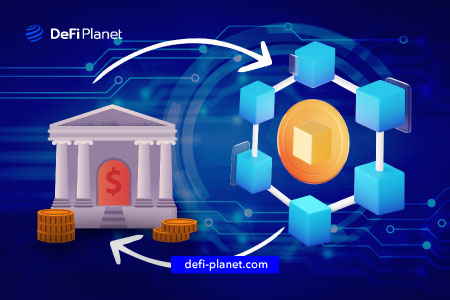As the crypto space expands, more individuals are embracing the concept of alternative banking services. The traditional financial sector views the banking system as a lending and borrowing structure. People must rely on traditional banks to keep their assets safe in an account, borrow money for various purposes, and earn interest on savings. Returns are typically lower than those available in crypto banks.
Borrowing from a traditional bank usually involves checks and an analysis of the potential borrower’s credit history. This process is not required in crypto banks.
This article examines the concept of crypto banks, their services, what distinguishes them, and highlights popular examples.
What is a crypto bank?
Crypto banks are financial institutions that combine elements of decentralized finance with traditional finance. They take the TradFi features and add DeFi to them. Some DeFi protocols appear to be incorporating standard banking features into their architecture.
In a crypto bank, users can access credit cards, debit cards, deposit accounts, interest-bearing accounts, collateralized loans, and more.
The difference between them and traditional banks is that they tend to be more decentralized and offer a more attractive reward scheme than their counterparts.
Some crypto banks include Revolut, Wirexapp, Change Invest, Nuri, etc.
It is important to note that some of the banks mentioned above can only operate in selected regions. It is crucial to conduct due diligence before using any of them.
What are the common features of a crypto bank?
Crypto banks typically provide their customers with unique features that combine elements of centralized and decentralized finance.
• Overcollateralized loans
Like traditional banks, crypto banks offer overcollateralized loans. Overcollateralized loans are those in which the collateral is worth more than the amount borrowed.
Traditional banks typically take collateral that is more valuable than the loan amount.
In the case of a crypto bank, the user may be required to constantly monitor their collateral amount to ensure that it does not go below a specified threshold. If this happens, their position will be liquidated.
• Flash loans
The user must repay this loan in the same transaction; otherwise, it is reversed. This means that the crypto borrower obtains the loan, utilizes it, and repays it in the same transaction. This type of loan is atypical in the conventional banking system. Customers are not required to provide collateral for flash loans.
• Traditional banking features
Crypto banks typically offer regular banking services. A crypto bank can provide a customer with a debit card denominated in cryptocurrencies or fiat currency. These can be used at ATMs, to pay for transactions, and much more, just like regular credit or debit cards.
Customers can open an account, deposit fiat currency, and cryptocurrency, and then conduct regular transactions. Typical crypto banks offer their customers interest-bearing accounts with higher interest rates than traditional banks. Crypto banks also provide deposit accounts.
One of the reasons that crypto banks offer traditional banking features is to make it easier for the average person to enjoy the best of both worlds.
• Yield farming
Another feature available in most crypto banks is yield farming.
Users can put their idle assets or tokens into liquidity pools, which can then be used to provide services such as decentralized lending, exchange services, and much more. Yield farmers typically earn a high-interest rate depending on the pool into which they inject liquidity and the purpose of the pool.
Do crypto banks require licenses?
Depending on their location, crypto banks may need a license to operate. Some countries have stringent regulations that must be followed when running a crypto bank, while others may provide greater latitude.
Before any crypto enterprise, such as a crypto bank, can operate in Singapore, it must first obtain a license based on the conditions established in the Payment Services Act and meet specific standards. It must request the appropriate license from the Monetary Authority of Singapore (MAS). The Monetary Authority of Singapore (MAS) is the apex financial body in Singapore, implementing the country’s cryptocurrency regulations.
At the time of writing, India lacks a body of legislation that governs the establishment of a crypto bank in the country, in contrast to Singapore, which has the Payment Services Act. Nonetheless, the crypto bank must apply for a license from the Indian apex financial institution while adhering to the country’s crypto tax legislation. India is now preparing legislation to oversee this process.
The Reserve Bank of India oversees every type of bank that operates in the country.
Countries such as the United States have stricter regulations governing the establishment of crypto banks that cater to the needs of residents. Before financial products, particularly those classified as securities, can be released, the issuing company must apply to the US Securities and Exchange Commission (SEC) for the appropriate license.
What are the differences between crypto banks and traditional banks?
Although crypto banks and traditional banks have similar features, they are not the same.
• Legality
Individuals or organizations must meet specific criteria before establishing a traditional bank. These criteria are typically far more stringent than those applicable to a crypto bank.
Bank activities have historically caused economic problems. For example, the cause of the Great Recession has been attributed to banks and other financial industry sectors. According to a 2011 Financial Crisis Inquiry Commission report, the issues highlighted could have been avoided if the banking sector had been adequately regulated.
According to the research, the government failed to regulate the financial system, specifically mortgage lending. The dangers that financial institutions imposed on themselves were substantial, and there was also excessive borrowing.
As a result, apex banks worldwide have enacted stringent regulations guiding the operations of conventional banks. This may not be apparent in crypto banks because they are nascent.
The return on investment or interest related to traditional banks’ financial products may be lower than that of crypto banks.
• Higher risks
Crypto banks are not as regulated as traditional banks because they are relatively nascent, and only a few countries have comprehensive laws guiding their operations. A central bank usually creates structures to ensure that banks do not go overboard in their lending services and other crucial aspects to prevent a repetition of the Great Recession.
Traditional banks defer to central banks in significant decision-making because their activities can affect the state of the economy. A wrong move could cause the country to go into recession. As a result of the oversight provided by apex banks, the risks associated with using traditional banks are usually low. This cannot be said of crypto banks.
Because of the legal ambiguity, crypto banks have higher risks associated with their operations.
• Insurance
Traditional banks are usually required to take out an insurance plan with the government insurance organization. For instance, in the United States, deposits are insured by the Federal Deposit Insurance Corporation (FDIC). Banks in Nigeria insure their deposits to a certain amount for individual customers with the Nigeria Deposit Insurance Corporation (NDIC).
This is to safeguard their clients’ deposits and thus hedge against unforeseen risks.
In most countries, crypto banks are not required to do this, although some obtain insurance through traditional insurance companies or decentralized insurance protocols.
• Few or no checks
In some cases, crypto banks may not conduct strict checks before allowing a person to sign up to use their services. Sometimes they seek a less stringent Know Your Customer (KYC) process than traditional banks.
Various checks are conducted before a conventional bank grants a lending facility to the average individual, but this is not the case with crypto banks.
In Conclusion,
- Crypto banks offer standard banking as well as decentralized finance services.
- This type of bank may have a higher risk level than conventional banks.
- They are often associated with higher returns on investment.
- Some crypto banks are not permitted to operate in certain regions.
- As always, it is crucial to conduct due diligence before employing the services of crypto banks.
If you would like to read more articles like this, visit DeFi Planet and follow us on Twitter, LinkedIn, Facebook, and Instagram.
“Take control of your crypto portfolio with MARKETS PRO, DeFi Planet’s suite of analytics tools”





















